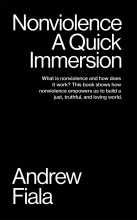

Nonviolence
A Quick Immersion
Library of Congress Control Number: 2020940731
Nonviolence. A Quick Immersion, by Andrew Fiala, offers a passionate presentation and defense of nonviolence in its various aspects and manifestations. It covers the whole spectrum of nonviolent movements and approaches: from the most spiritually and religiously motivated, to those primarily moral and practical; from Buddha and Mahavira, Socrates and Jesus, Gandhi and King, Desmond Tutu and the Dalai Lama, to Gene Sharp and Malala. Fiala writes with the conviction that nonviolent movements have made profound and lasting impacts in the world, and that they continue to grow and be powerful because of their internal consistency and integrity. Besides offering well-informed and clearly presented views, the most important quality of this book is its insistence on the rootedness of nonviolence in the traditional and universal values of truth and justice, respect and love. Fiala rightly insists that the ultimate concerns behind our decisions how to live and interact with others must be the affirmation of life and human flourishing. Predrag Cicovacki, Professor of Philosophy at the College of the Holy Cross
Fiala’s Nonviolence: A Quick Immersion is a superbly lucid introduction to nonviolence which is both succinct and rigorous. It manages to navigate through several important and sometimes thorny objections, debates and reflections with impressively clear explanations and accessible language.
This brilliant book presents a nuanced overview of the range of things referred to as 'nonviolence’, as well as a measured and informative discussion of what is ‘violence’. It provides helpful explorations of the relation between nonviolence and democracy, the ideological proximity to pacifism and anarchism, and the conceptual proximity to love, truth, and justice. Also clarified are the differences between pragmatic and principled approaches, and of course, crucially, how and why nonviolence can be effective. The book also offers valuable reflections on ’structural violence’ and on the transformative potential of nonviolence on both the individual and society. And it contains an informative history of nonviolence which demonstrates its various independent roots in diverse religions traditions as well as non-religious arguments. Plenty of examples from a wide range of contexts furthermore illustrate the range of methods available.
In sum, this book is a splendid introduction to nonviolence — thorough, nuanced, clear and informative. Highly recommended. Alexandre Christoyannopoulos, professor of Politics, History and International Relations. Loughborough University (UK)
Andrew Fiala has written an admirablyclear, instructive, and approachable introduction to a very large and important topic. Written for the non-specialist, Nonviolence approaches its topic from different disciplinary perspectives – including history, religion, social science, and, of course, philosophy – giving the reader a sense for the big picture, while still getting to the heart of nonviolence. The concise introduction touches on all the main questions: what is nonviolence and how does it compare to violence; who uses nonviolence and to whom is it directed; and how does it work and why should we use it. Fiala makes nonviolence meaningful to the reader by showing how it’s already an ordinary part of our lives, and not just a marginal phenomenon. Human flourishing, in terms of art, science, and philosophy, but also in terms of relationships, requires a nonviolent (or peaceful) backdrop. The problem is that the opportunity to live nonviolently is unfairly distributed: those who are privileged can live their lives in peace, but only against a backdrop of injustice and violence directed against “the other.”Fiala makes a timely contribution to the conversation around Black Lives Matter by showing how nonviolence reveals and responds to this kind of structural injustice. The challenge, then, is not so much about learning how to be nonviolent, but to expand the nonviolent circle so that all might be included. Lee-Ann Chae, professor of Philosophy of Temple University.
Summary
This book provides an overview of nonviolence. It offers answers to the questions of what nonviolence is, how and why it ought to be used, and who ought to employ it. The book discusses examples of successful nonviolent social protest, from twentieth century movements for civil rights and colonial liberation to the Arab Spring and contemporary Black Lives Matter protests, and considers recent research that explains the power of nonviolence. It also explores philosophical and religious sources of nonviolence, while discussing key historical figures including Leo Tolstoy, Mohandas K. Gandhi, Martin Luther King Jr., Desmond Tutu, the Dalai Lama, and Malala Yousafzai. This book offers insight into the link between nonviolence and democracy. And it reminds us that nonviolence gives us the power to build a better —more just, truthful, and loving— world.

Andrew Fiala Ph.D., is Professor of Philosophy and Director of the Ethics Center at California State University, Fresno. His published work includes: Simplicity (Palm and Sierra, 2020), Transformative Pacifism (Bloomsbury, 2018), The Routledge Handbook of Pacifism and Nonviolence (Routledge, 2017), The Peace of Nature and the Nature of Peace (Brill 2015), The Bloomsbury Companion to Political Philosophy (Bloomsbury 2015), and the 9th edition of Ethics: Theory and Contemporary Issues with co-author Barbara MacKinnon (Cengage, 2017). Fiala is a past President of Concerned Philosophers for Peace. He writes a weekly column on religion, politics, and ethics for the Fresno Bee. For more information: www.andrewfiala.com.
Blurb:
What is nonviolence and how does it work? This book shows how nonviolence empowers us to build a just, truthful, and loving world.

